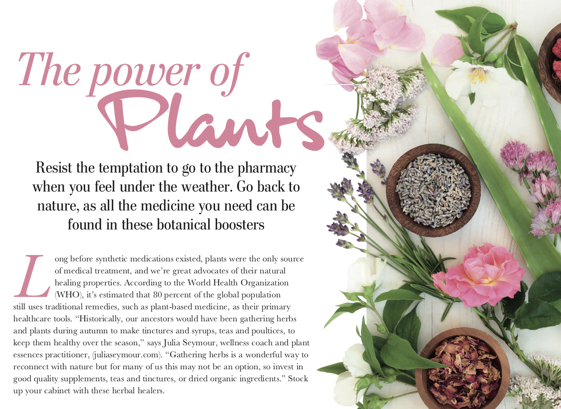This month I wrote a piece for Natural Health Magazine on plants we can use to boost our immune system. This is so important in Autumn, because as the seasons change we need to prepare for the colder, darker months ahead. Historically, our ancestors would have been gathering herbs and plants at this time, to make tinctures and syrups, teas and poultices to keep them healthy over Winter. Gathering herbs is a wonderful way to reconnect with nature, but for many of us this may not be an option, so invest in good quality supplements, teas and tinctures or fresh/dried organic ingredients.
Lemons
Lemons are one of the most important and versatile natural medicines. In Spain, so many medicinal uses are ascribed to them that there are whole books on written on the subject! As well as being a familiar food, lemons are rich in potassium and have a high Vitamin C content (twice as much as oranges) that helps to improve resistance to infection. Lemons are said to be antiseptic, antirheumatic, antibacterial, antioxidant and also reduce fever. They are brilliant for colds and flu. Despite their acid content, once digested, lemons have an alkaline effect within the body, vital for good health.
For colds, combine 20ml of lemon juice with 50ml of hot water, together with some fresh ginger and honey. Drink several times a day. For sore throats, gargle with 50/50 lemon juice and warm water. Drink a cup of hot water and lemon daily as a preventative medicine to cleanse the gut and increase alkalinity in the body. Ideally, start each day with this as your hot drink, in place of tea or coffee, as this will also flush the urinary tract and stimulate the gastrointestinal tract.

Liquorice
The sweetness of liquorice has made it a well-known confectionary for years. Liquorice contains glycyrrhizic acid, which is 50 times sweeter than sugar, yet it is also a fantastic herbal medicine – a powerful anti-inflammatory that helps with a huge range of conditions, such as mouth ulcers, coughs and bronchitis, arthritis, inflamed joints and skin problems. It helps to stimulate the adrenal glands to help with chronic fatigue and when ingested, the glycyrrhizin breaks down in the gut and has an anti-inflammatory and anti-arthritic effect, similar to hydrocortisone and other corticosteroid hormones. It contains phytoestrogens and can be used to treat PMS and menopausal symptoms, such as hot flushes.
Liquorice should be taken cautiously as excessive doses can cause serious side-effects such as high blood pressure and heart palpitations, and it is not recommended for those who are pregnant. Drink liquorice root tea, rub liquorice root powder onto mouth ulcers or take supplements. Liquorice supplements can also be purchased deglycyrrhizinated (DGL), which are safer for longer term use.
 Elder
Elder
Elderflower has grown in popularity in the past 20 years and is now synonymous with delicious cordial and sparkling drinks. But elderflowers and elderberries are also valuable remedies for colds, flu and chesty conditions. Elder is anti-viral, anti-catarrhal, anti-inflammatory, diuretic and also increases sweating. The berries contain vitamins A and C. A study in Israel found that 90% of people given elderberry extract recovered in 2-3 days, whilst 90% of those taking the placebo took up to 6 days. Other clinical research supports the use of elderberry extract as an effective treatment for flu.
Elderflowers and berries grow in abundance in the UK, so this is one thing that you can gather safely during Spring and Summer to make your own cordial and tea from the flowers and wine, jam and syrup from the berries! Elderberry syrup is a great tonic that can be made in autumn and consumed throughout Winter to fight colds and flu. You can also add it to pancakes …
 Garlic
Garlic
Garlic whole, chopped or crushed, has been used as a medicine and a tonic for thousands of years. Known for its strong taste and smell, it is a wonderful herbal medicine because it is completely safe for home use and is an excellent treatment for many health problems. It is also delicious! It can be used for chest, nose and throat infections, to reduce cholesterol, reduce high blood pressure and lower blood sugar levels. It is even used to treat intestinal worms. Before the discovery of antibiotics, garlic was a treatment for many infections and was used to dress wounds in the First World War.
Research suggests that it is best to crush garlic and then wait for 10 minutes before adding to food or using as a medicine because this allows alliin to turn into allicin (becoming antiseptic). You can eat raw garlic on its own, add to food and take garlic oil supplements. Make a tea by steeping some chopped or minced garlic in hot water for a few minutes, then remove and add honey or ginger for taste.
 Echinacea
Echinacea
Echinacea (Purple Coneflower) is a well-known herbal remedy for colds, flu and immune support. It has a tonic action on the body’s immune system and it was known in 19th century America as Snakeroot because it was used to treat snake bites. Echinacea can fight infection, both viral and bacterial and helps to clear toxins from the body. It is said to stimulate cells in the body whose primary function is to fight invading particles and organisms and to increase the number of white blood cells and spleen cells. There are nine species of Echinacea, with three having medicinal value.
You can use Echinacea as a preventative treatment during the cold and flu season and it can be consumed in tea, tablet or tincture form. If you feel a cold or flu coming on, take Echinacea several times a day when you first notice the symptoms to help reduce the duration of the illness or to stop it in its tracks.
Read the whole article in Natural Health Magazine, October 2018 edition.



Recent Comments